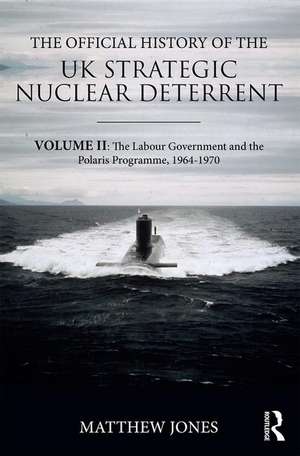The Official History of the UK Strategic Nuclear Deterrent: Volume II: The Labour Government and the Polaris Programme, 1964-1970: Government Official History Series
Autor Matthew Jonesen Limba Engleză Hardback – 11 mai 2017
Written with full access to the UK documentary record, Volume II examines the controversies that developed over nuclear policy following the arrival in office of a Labour government led by Harold Wilson in October 1964 that openly questioned the independence of the deterrent. Having decided to preserve the Polaris programme, Labour ministers were nevertheless committed not to develop another generation of nuclear weapons beyond those in the pipeline, placing major doubts over the long-term future of the nuclear programme and collaboration with the United States. Defence planners also became increasingly concerned that the deployment of Soviet anti-ballistic missile (ABM) defences around Moscow threatened to undermine the ability of Polaris to fulfil its role as a national strategic nuclear deterrent. During 1967, under heavy pressures to control defence spending, a protracted debate was conducted within Whitehall over the future of Polaris and how to respond to the evolving ABM challenge. The volume concludes with Labour’s defeat at the general election of June 1970, by which time the Royal Navy had assumed the nuclear deterrent role from the RAF, and plans had already been formulated for a UK project to improve Polaris which could both ensure its continuing credibility and rejuvenate the Anglo-American nuclear relationship.
This book will be of much interest to students of British politics, Cold War history, nuclear proliferation and international relations.
| Toate formatele și edițiile | Preț | Express |
|---|---|---|
| Paperback (2) | 339.01 lei 3-5 săpt. | +40.62 lei 6-12 zile |
| Taylor & Francis – 23 ian 2019 | 339.01 lei 3-5 săpt. | +40.62 lei 6-12 zile |
| Taylor & Francis – 23 ian 2019 | 404.80 lei 6-8 săpt. | |
| Hardback (2) | 1026.61 lei 6-8 săpt. | |
| Taylor & Francis – 11 mai 2017 | 1026.61 lei 6-8 săpt. | |
| Taylor & Francis – 11 mai 2017 | 1027.65 lei 6-8 săpt. |
Din seria Government Official History Series
-
 Preț: 381.70 lei
Preț: 381.70 lei -
 Preț: 351.76 lei
Preț: 351.76 lei -
 Preț: 339.01 lei
Preț: 339.01 lei -
 Preț: 462.90 lei
Preț: 462.90 lei -
 Preț: 379.37 lei
Preț: 379.37 lei -
 Preț: 438.36 lei
Preț: 438.36 lei -
 Preț: 448.44 lei
Preț: 448.44 lei -
 Preț: 500.63 lei
Preț: 500.63 lei - 18%
 Preț: 1016.86 lei
Preț: 1016.86 lei -
 Preț: 468.51 lei
Preț: 468.51 lei -
 Preț: 337.87 lei
Preț: 337.87 lei - 27%
 Preț: 864.77 lei
Preț: 864.77 lei - 27%
 Preț: 837.47 lei
Preț: 837.47 lei -
 Preț: 428.18 lei
Preț: 428.18 lei - 11%
 Preț: 346.01 lei
Preț: 346.01 lei -
 Preț: 416.22 lei
Preț: 416.22 lei -
 Preț: 403.64 lei
Preț: 403.64 lei -
 Preț: 334.03 lei
Preț: 334.03 lei - 17%
 Preț: 268.23 lei
Preț: 268.23 lei - 18%
 Preț: 263.20 lei
Preț: 263.20 lei -
 Preț: 391.65 lei
Preț: 391.65 lei -
 Preț: 389.66 lei
Preț: 389.66 lei - 18%
 Preț: 1188.44 lei
Preț: 1188.44 lei - 23%
 Preț: 374.04 lei
Preț: 374.04 lei
Preț: 1027.65 lei
Preț vechi: 1253.23 lei
-18% Nou
Puncte Express: 1541
Preț estimativ în valută:
196.64€ • 214.27$ • 165.70£
196.64€ • 214.27$ • 165.70£
Carte tipărită la comandă
Livrare economică 24 aprilie-08 mai
Preluare comenzi: 021 569.72.76
Specificații
ISBN-13: 9781138292062
ISBN-10: 1138292060
Pagini: 582
Dimensiuni: 156 x 234 x 38 mm
Greutate: 1.24 kg
Ediția:1
Editura: Taylor & Francis
Colecția Routledge
Seria Government Official History Series
Locul publicării:Oxford, United Kingdom
ISBN-10: 1138292060
Pagini: 582
Dimensiuni: 156 x 234 x 38 mm
Greutate: 1.24 kg
Ediția:1
Editura: Taylor & Francis
Colecția Routledge
Seria Government Official History Series
Locul publicării:Oxford, United Kingdom
Public țintă
Postgraduate, Professional, and UndergraduateCuprins
Preface
1. Labour in power: The Atlantic Nuclear Force and the Polaris programme, October 1964 – January 1965
2. Nuclear testing, the future of the MDA, and the defence review, January – October 1965
3. The demise of the ANF proposals and the end of the nuclear sharing debate, November 1965 – July 1966
4. A nuclear weapons programme at the crossroads, January - September 1966
5. A new context for nuclear policy, October 1966-February 1967
6. ‘Shades of Skybolt,’, February-May 1967
7. ‘To destroy what ashes?’ May-July 1967
8. Polaris in jeopardy, July – November 1967
9. Polaris reprieved and the launch of a pilot study, November 1967 – January 1968
10. The Press Gang at work and the birth of ‘Super Antelope’, January – June 1968
11. The Kings Norton report and its aftermath, July-December 1968
12. The revival of the Anglo-American nuclear relationship, and the approach of SALT, January-October 1969
13. A matter of timing, October 1969 – June 1970
Postscript: The independent deterrent and the coming of Polaris
1. Labour in power: The Atlantic Nuclear Force and the Polaris programme, October 1964 – January 1965
2. Nuclear testing, the future of the MDA, and the defence review, January – October 1965
3. The demise of the ANF proposals and the end of the nuclear sharing debate, November 1965 – July 1966
4. A nuclear weapons programme at the crossroads, January - September 1966
5. A new context for nuclear policy, October 1966-February 1967
6. ‘Shades of Skybolt,’, February-May 1967
7. ‘To destroy what ashes?’ May-July 1967
8. Polaris in jeopardy, July – November 1967
9. Polaris reprieved and the launch of a pilot study, November 1967 – January 1968
10. The Press Gang at work and the birth of ‘Super Antelope’, January – June 1968
11. The Kings Norton report and its aftermath, July-December 1968
12. The revival of the Anglo-American nuclear relationship, and the approach of SALT, January-October 1969
13. A matter of timing, October 1969 – June 1970
Postscript: The independent deterrent and the coming of Polaris
Notă biografică
Matthew Jones is Professor of International History at the London School of Economics and Political Science, UK, and author of, amongst other books, After Hiroshima: The United States, Race, and Nuclear Weapons in Asia, 1945–1965 (2010).
Descriere
Volume II of The Official History of the UK Strategic Nuclear Deterrent provides an authoritative and in-depth examination of the British Government’s strategy towards nuclear deterrent from 1964 to 1970. Written with full access to the UK documentary record, Volume II examines the nuclear policy of the Labour Government that took office in October 1964. Having decided to preserve the Polaris programme, ministers were nevertheless committed not to develop another generation of nuclear weapons beyond those in the pipeline, placing major questions over the long-term future of the nuclear programme and collaboration with the United States. This book will be of much interest to students of British politics, nuclear proliferation and international relations.
Recenzii
'The author had access to Government records and was able to interview some of the participants to cover the high-level politics. I was surprised to find it difficult to break off reading because it was compiled from extracts from files, letters and reports of meetings. Professor Jones has done a splendid job putting it all together as a readable story.'--Reg Milne, Afterburner



